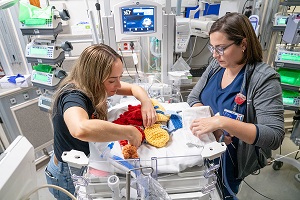Speak with a Care Specialist
Speak one on one with a C.A.R.E. Program expert that can help you identify resources, address caregiver stress, learn about educational classes,...
Certain respiratory disorders make it difficult for your lungs to do their job. A lung transplant performed at Henry Ford Transplant can help you breathe easier and enjoy a better quality of life. Many recipients lead active, normal lives after transplantation.
We have been a state leader in lung transplants since performing the first procedure in Detroit, in 1994. In addition to our expertise, we provide support at every step along the way.
When you come to Henry Ford for a lung transplant you benefit from:
Other centers may open up your chest. But our surgeons perform lung transplants through small 4-inch incisions on the side of your chest. A single-lung transplant requires two incisions, while a double-lung transplant requires four. Benefits of smaller surgical incisions include:
Your chance for a successful transplant is better when you receive the surgery before your health becomes much worse. With FAST Track, our lung transplant team completes all of your required medical tests and psychological assessments within a couple of days.
We receive your test results back quickly to place you on the national transplant waitlist as soon as possible. Your transplant coordinator will assist you with the FAST Track process.
To learn more or request a consult, submit an online form or call: (313) 916-1269.
Speak one on one with a C.A.R.E. Program expert that can help you identify resources, address caregiver stress, learn about educational classes,...
Ready, Set, BABY Class intended for patients giving birth at Henry Ford Hospital Detroit This 2 hour In Person with Live Virtual Access interactive...
Speak one on one with a C.A.R.E. Program expert that can help you identify resources, address caregiver stress, learn about educational classes,...
Speak one on one with a C.A.R.E. Program expert that can help you identify resources, address caregiver stress, learn about educational classes,...





Donating your kidney is a procedure that has become increasingly safer due to advancements in medicine, improved surgical techniques and a highly sophisticated donor selection process.

Typically, advanced liver disease occurs in older people. But recently, young people have been developing advanced liver disease due to alcohol consumption. Learn more about this sobering fact--and how much alcohol is considered 'safe.'

If you have diabetes, you’re at high risk of fatty liver disease. Learn what it is and how you can help prevent it.
We use cookies to improve your website experience. By using this site, you agree to our Terms of Use. Read our Internet Privacy Statement to learn what information we collect and how we use it.